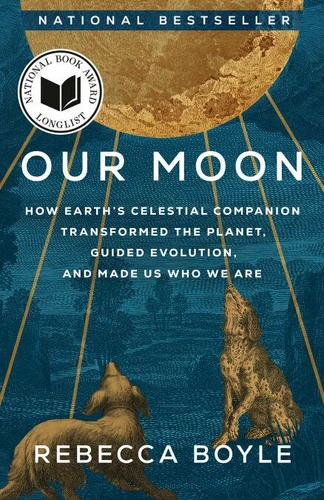Our Moon. How Earth's Celestial Companion Transformed the Planet, Guided Evolution, and Made Us Who We Are
Par :Formats :
Disponible dans votre compte client Decitre ou Furet du Nord dès validation de votre commande. Le format ePub protégé est :
- Compatible avec une lecture sur My Vivlio (smartphone, tablette, ordinateur)
- Compatible avec une lecture sur liseuses Vivlio
- Pour les liseuses autres que Vivlio, vous devez utiliser le logiciel Adobe Digital Edition. Non compatible avec la lecture sur les liseuses Kindle, Remarkable et Sony
- Non compatible avec un achat hors France métropolitaine
 , qui est-ce ?
, qui est-ce ?Notre partenaire de plateforme de lecture numérique où vous retrouverez l'ensemble de vos ebooks gratuitement
Pour en savoir plus sur nos ebooks, consultez notre aide en ligne ici
- Nombre de pages336
- FormatePub
- ISBN978-0-593-12973-9
- EAN9780593129739
- Date de parution16/01/2024
- Protection num.Adobe DRM
- Taille32 Mo
- Infos supplémentairesepub
- ÉditeurRandom House
Résumé
LONGLISTED FOR THE NATIONAL BOOK AWARD . NATIONAL BESTSELLER . "A riveting feat of science writing that recasts that most familiar of celestial objects into something eerily extraordinary, pivotal to our history, and awesome in the original sense of the word."-Ed Yong, New York Times bestselling author of An Immense WorldWINNER OF THE LOS ANGELES TIMES BOOK PRIZE . A NEW YORKER AND SMITHSONIAN BEST BOOK OF THE YEAR .
A New York Times Book Review Editors' Choice Many of us know that the Moon pulls on our oceans, driving the tides, but did you know that it smells like gunpowder? Or that it was essential to the development of science and religion? Acclaimed journalist Rebecca Boyle takes readers on a dazzling tour to reveal the intimate role that our 4.51-billion-year-old companion has played in our biological and cultural evolution.
Our Moon's gravity stabilized Earth's orbit-and its climate. It drew nutrients to the surface of the primordial ocean, where they fostered the evolution of complex life. The Moon continues to influence animal migration and reproduction, plants' movements, and, possibly, the flow of the very blood in our veins. While the Sun helped prehistoric hunters and gatherers mark daily time, early civilizations used the phases of the Moon to count months and years, allowing them to plan farther ahead.
Mesopotamian priests recorded the Moon's position in order to make predictions, and, in the process, created the earliest known empirical, scientific observations. In Our Moon, Boyle introduces us to ancient astronomers and major figures of the scientific revolution, including Johannes Kepler and his influential lunar science fiction. Our relationship to the Moon changed when Apollo astronauts landed on it in 1969, and it's about to change again.
As governments and billionaires aim to turn a profit from its resources, Rebecca Boyle shows us that the Moon belongs to everybody, and nobody at all.
A New York Times Book Review Editors' Choice Many of us know that the Moon pulls on our oceans, driving the tides, but did you know that it smells like gunpowder? Or that it was essential to the development of science and religion? Acclaimed journalist Rebecca Boyle takes readers on a dazzling tour to reveal the intimate role that our 4.51-billion-year-old companion has played in our biological and cultural evolution.
Our Moon's gravity stabilized Earth's orbit-and its climate. It drew nutrients to the surface of the primordial ocean, where they fostered the evolution of complex life. The Moon continues to influence animal migration and reproduction, plants' movements, and, possibly, the flow of the very blood in our veins. While the Sun helped prehistoric hunters and gatherers mark daily time, early civilizations used the phases of the Moon to count months and years, allowing them to plan farther ahead.
Mesopotamian priests recorded the Moon's position in order to make predictions, and, in the process, created the earliest known empirical, scientific observations. In Our Moon, Boyle introduces us to ancient astronomers and major figures of the scientific revolution, including Johannes Kepler and his influential lunar science fiction. Our relationship to the Moon changed when Apollo astronauts landed on it in 1969, and it's about to change again.
As governments and billionaires aim to turn a profit from its resources, Rebecca Boyle shows us that the Moon belongs to everybody, and nobody at all.
LONGLISTED FOR THE NATIONAL BOOK AWARD . NATIONAL BESTSELLER . "A riveting feat of science writing that recasts that most familiar of celestial objects into something eerily extraordinary, pivotal to our history, and awesome in the original sense of the word."-Ed Yong, New York Times bestselling author of An Immense WorldWINNER OF THE LOS ANGELES TIMES BOOK PRIZE . A NEW YORKER AND SMITHSONIAN BEST BOOK OF THE YEAR .
A New York Times Book Review Editors' Choice Many of us know that the Moon pulls on our oceans, driving the tides, but did you know that it smells like gunpowder? Or that it was essential to the development of science and religion? Acclaimed journalist Rebecca Boyle takes readers on a dazzling tour to reveal the intimate role that our 4.51-billion-year-old companion has played in our biological and cultural evolution.
Our Moon's gravity stabilized Earth's orbit-and its climate. It drew nutrients to the surface of the primordial ocean, where they fostered the evolution of complex life. The Moon continues to influence animal migration and reproduction, plants' movements, and, possibly, the flow of the very blood in our veins. While the Sun helped prehistoric hunters and gatherers mark daily time, early civilizations used the phases of the Moon to count months and years, allowing them to plan farther ahead.
Mesopotamian priests recorded the Moon's position in order to make predictions, and, in the process, created the earliest known empirical, scientific observations. In Our Moon, Boyle introduces us to ancient astronomers and major figures of the scientific revolution, including Johannes Kepler and his influential lunar science fiction. Our relationship to the Moon changed when Apollo astronauts landed on it in 1969, and it's about to change again.
As governments and billionaires aim to turn a profit from its resources, Rebecca Boyle shows us that the Moon belongs to everybody, and nobody at all.
A New York Times Book Review Editors' Choice Many of us know that the Moon pulls on our oceans, driving the tides, but did you know that it smells like gunpowder? Or that it was essential to the development of science and religion? Acclaimed journalist Rebecca Boyle takes readers on a dazzling tour to reveal the intimate role that our 4.51-billion-year-old companion has played in our biological and cultural evolution.
Our Moon's gravity stabilized Earth's orbit-and its climate. It drew nutrients to the surface of the primordial ocean, where they fostered the evolution of complex life. The Moon continues to influence animal migration and reproduction, plants' movements, and, possibly, the flow of the very blood in our veins. While the Sun helped prehistoric hunters and gatherers mark daily time, early civilizations used the phases of the Moon to count months and years, allowing them to plan farther ahead.
Mesopotamian priests recorded the Moon's position in order to make predictions, and, in the process, created the earliest known empirical, scientific observations. In Our Moon, Boyle introduces us to ancient astronomers and major figures of the scientific revolution, including Johannes Kepler and his influential lunar science fiction. Our relationship to the Moon changed when Apollo astronauts landed on it in 1969, and it's about to change again.
As governments and billionaires aim to turn a profit from its resources, Rebecca Boyle shows us that the Moon belongs to everybody, and nobody at all.




